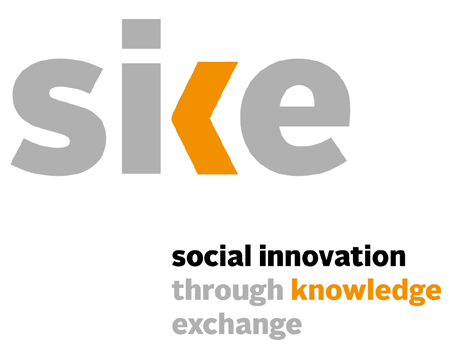SIKE – Social Innovation through Knowledge Exchange
“Social Innovation through Knowledge Exchange” (SIKE) demonstrates the potential of universities to use their knowledge in order to affect social change in a direct and meaningful way. The project is doing so by developing new paradigms and tools for knowledge exchange practice that embrace social innovation, encourage social entrepreneurship and offer more effective support to local communities. The partners – leading socially innovative universities and experienced social innovation drivers – are working together to create an ecosystem that nurtures and supports sustainable, resilient and responsible innovation.

European Union - Erasmus+
The SIKE project is a response to the need for universities to more actively drive social change through knowledge exchange and social innovation (SI). "Social innovations are new ideas (products, services, and models) that simultaneously meet social needs (more effectively than alternatives) and create new social relationships or collaborations." (Murray, Caulier-Grice, and Mulgan, March 2010).
The SIKE project is closely related to existing initiatives and core missions of the participating organizations. All participating universities play an active role in researching, teaching, or supporting social innovators within their communities and often collaborate with them on projects. In addition, all SI partners have worked extensively with university partners - and others - to create an SI ecosystem in their region.
By focusing on knowledge exchange that specifically promotes social innovation and entrepreneurship, the SIKE project directly contributes to equity, social cohesion, and active citizenship while strengthening creativity and innovation, including entrepreneurship, at all levels of education and training.
All in all, this project aims to lay the groundwork for a radical shift in the practice of knowledge exchange that incorporates social innovation by adapting conventional, commercial, and process innovations to the social needs of communities. As such, SIKE facilitates both the exchange, flow, and co-creation of knowledge and the promotion of entrepreneurship and entrepreneurial skills among its participants and stakeholders, while developing new and innovative approaches to teaching and learning through its training program and online tools.
- Coordinator: Glasgow Caledonian University (GCU) United Kingdom
- The Melting Pot (TMP) United Kingdom
- Social Innovation Exchange (SIX) United Kingdom
- The University of Aveiro (UAV) Portugal
- Santa Casa da Misericórdia de Lisboa (SCML) Portugal
- Universidad de Deusto (UD) Spain
- Business Innovation Brokers (BiB) Spain
- University of Applied Science (VERN) Croatia
- Social Innovation Laboratory (SIL) Croatia
- Duisburg Social Impact Lab (DSIL) Germany
The main objective of the SIKE project is to support social innovation through knowledge exchange. To this end, alliances are being forged between actors in the social innovation ecosystem. The goal is to develop social innovation through knowledge exchange units that specifically adapt knowledge exchange tools and processes to the needs of social innovators. The project also aims to foster social entrepreneurial skills within the university and regional community. In summary, the following five objectives and outcomes play an important role in SIKE:
- SIKE stimulates knowledge flow and exchange between universities and businesses, in this case social enterprises, directly involved in supporting social innovators.
- SIKE fosters innovation within participating institutions and the broader socio-economic environment through the joint development and implementation of new multidisciplinary, problem-oriented professional development programs, the joint development of solutions to difficult problems, and the development of SI practice.
- SIKE develops social entrepreneurial mindsets and skills by collaborating with social enterprises to develop programs for learning and applying cross-cutting skills aimed at strengthening employability, creativity, and new career paths;
- SIKE opens new learning opportunities through the practical application of social entrepreneurial skills that may include and/or lead to the commercialization of new services, products and prototypes, the creation of start-ups and spin-offs.
- SIKE is testing innovative measures to promote SI.
The SIKE project takes a co-creative approach in developing parallel initiatives in all five partner regions. The project achieves its objectives through 9 work packages (WPs) carried out in three phases:
- Preparation and Contextualization
- Implementation
- Consolidation and validation
The responsibility for managing and leading these work packages has been distributed equally among the partners, so that each partner is co-responsible for at least one work package to ensure that the responsibility is distributed evenly throughout the consortium (WP9). In addition, all partner institutions coordinate the key development activities in their own region. Quality assurance and evaluation of the project will be carried out by an Advisory and Evaluation Committee established in each region, composed of four associated partners and representatives of the partner institutions. The establishment of the committee is overseen by SIL and VERN. They all meet four times (either in person or virtually) during the project period to present their evaluations. The Committee has a dual role: it evaluates the social innovation projects - the case studies and projects developed under the SIKE activities (WP6) - as well as the quality of project outputs and overall project activities (WP7).




![[Translate to English:] [Translate to English:]](/storages/zentraler_bilderpool/_processed_/a/f/csm_Kontakt_b86e8d8ecc.png)
![[Translate to English:] [Translate to English:]](/storages/sfs-sowi/_processed_/6/c/csm_Glasfront_sfs_Header_eae6d325d3.jpg)
